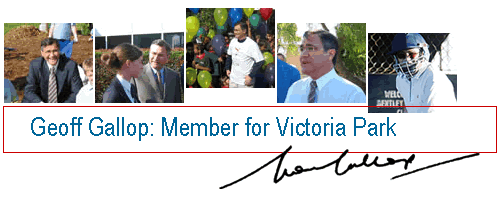
Geoff Gallop represented the Legislative Assembly seat of Victoria Park for all of the almost twenty years that he was in State politics. Although he had to allow for various boundary changes during that time which brought different suburbs and part/suburbs in and out of the electorate, the suburb of Victoria Park was always the centre of the electorate. The electorate was created in 1930 and prior to 1986 had been represented by Labor members, including former ALP parliamentary leader Ron Davies, except for one period between 19 when the member was local pharmacist and Independent William Raymond Read who usually supported the non-Labor cause.
Shortly after the February 1986 state election it was announced that Ron Davies would be offered the position of Western Australia's Agent-General in London At the time he was preselected for Victoria Park Geoff was a member of the Fremantle City Council and resided in the Fremantle area. The ALP selection committees eventually decided to endorse Gallop's fellow Fremantle Councillor Norman Marlborough as the ALP candidate for the by-election in Cockburn made necessary by the death of incumbent Clive Hughes, and Gallop was endorsed as the candidate for Victoria Park. He was elected in June 1986 and in January 1987 he and his wife and two sons moved into the house he had purchased in Teague Street, Victoria Park.
Reflecting on his twenty years as member Geoff Gallop suggests that living in the electorate had distinct advantages in terms of balancing family and political life.1
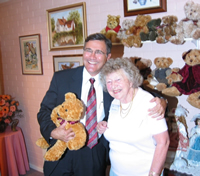 Curtin University Library. Geoff Gallop Collection. Records of Geoff Gallop. Geoff Gallop at Brownlie Towers housing complex, Victoria Park, W.A., 2004. GG00020/17
Curtin University Library. Geoff Gallop Collection. Records of Geoff Gallop. Geoff Gallop at Brownlie Towers housing complex, Victoria Park, W.A., 2004. GG00020/17Local events were always 'just around the corner' and with both his children from 1987 onwards attending schools in the district and participating in local sport this provided natural ongoing links with the community. He himself was treasurer of the East Victoria Park Primary School Parents and Citizens and secretary of the Victoria Park Junior Football Club.
From the outset Gallop set out to build a strong and effective electorate office and his electorate secretary Kay Clark worked for him throughout the whole of his political career. A constant stream of material was issued from his office including welcomes to newly enrolled electors or naturalised citizens, annual calendars, Christmas cards with a theme, 'sorry you were out' doorknocking notes (for many years he tried to doorknock in one different street each week), details of his involvement in Neighbourhood Watch and, above all, issue-based pamphlets. For example, counteracting crime was a major topic in the first such pamphlets as were issues relating to the environment and what he described as 'report cards' to his electors about his own activities and those of his government.
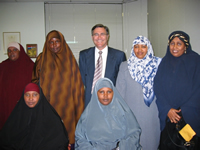 Curtin University Library. Geoff Gallop Collection. Records of Geoff Gallop. Geoff Gallop with a group of Somali women migrants, 2004. GG00020/51
Curtin University Library. Geoff Gallop Collection. Records of Geoff Gallop. Geoff Gallop with a group of Somali women migrants, 2004. GG00020/51As a backbencher Gallop worked on a strategy of keeping every Friday morning for the Electorate Office and appointments with electors and local associations seeking support. As the years went by and he became first a minister and eventually premier, he was increasingly unable to be present as often as he would have wished. Nevertheless, throughout his career he tried to keep at least one morning a week for electors and groups and also public meetings, as for example, when he dealt with the women's prison issue discussed in the article on his political career.
Throughout his career he made extensive use of 'correspondence and pamphlets' to help fill the gaps in his own presence and, like many a leader before him, his wife represented him at various functions on many occasions.
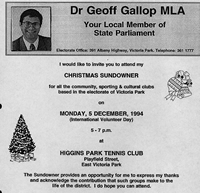 Christmas invitation for community groups in Victoria Park.
Christmas invitation for community groups in Victoria Park.Curtin University Library. Geoff Gallop Collection. Records of Geoff Gallop. Direct mail, 1993 - 1994. GG00016/6.
Perhaps the most distinctive feature of Geoff Gallop's career as a constituency politician was the extensive work he did on compiling short histories of the suburbs within his electorate in what he described as his Local History Project. A series of eleven articles were published in the Southern Gazette and also the Canning-Melville Times in the last few months of 1989 and then collected together as From the Swan to the Canning. Historical notes on Victoria Park and Surrounding Districts issued in December 1989.2 These articles were based both on his own research and on information supplied by various individuals and local associations. The suburbs dealt with in the publication included Bentley, Burswood-Rivervale, Carlisle, East Victoria Park, Lathlain, St James, Welshpool, Wilson (formerly Beeloo) and Victoria Park itself. In addition, Gallop produced a series of 'Know Your Suburbs' pamphlets with copies distributed to all residents in each relevant area.
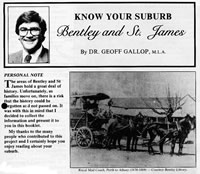 Front page of 'Know Your Suburb: Bentley and St. James'
Front page of 'Know Your Suburb: Bentley and St. James' Curtin University Library. Geoff Gallop Collection. Records of Geoff Gallop. Direct mail, 1990. G00016/3.
Then in April 1994 he delivered a paper A Sense of Place for a Sense of Community to an Australian Library and Information Association Conference at Curtin University of Technology.3 After describing the details of his project he reflected on what he had learned about the history of the relevant suburbs, suggesting that 'a sense of history is an essential part of any community' which 'by its very nature ... elicits a positive and caring attitude towards people'.
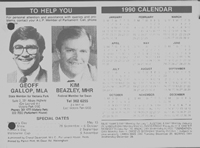 1990 calendar
1990 calendarCurtin University Library. Geoff Gallop Collection. Records of Geoff Gallop. Direct mail, 1990. GG00016/3.
Just over a decade after he had entered politics and in his new capacity as Opposition leader in February 1997, Geoff Gallop prepared a paper entitled 'The Role of a Member of Parliament' for new members of the Labour caucus. This was subsequently published as 'Combating Cynicism' in the July 1997 issue of 'The Parliamentarian'.4
In the paper he contended that being elected was only the beginning of the process and that members needed from the outset 'an understanding of what is expected, if only to provide a sense of purpose'. Members acquired on the one hand the 'resources of office', 'the powers of Parliament' and 'the privileges of Parliament' but on the other hand 'the degree to which MPs have lost status in the community' he believed, was indicated by 'the questioning of each of these powers'.5 Gallop's remedy was for members to focus on each of their six levels of responsibility-to the Electorate, the Political Party, the Parliamentary Party, the Portfolio, the Parliament and the Community-and this required a 'new professionalism' and 'new standards of conduct'. In his view 'process' issues were just as important as 'policy issues' and there could be no escape from this 'fundamental political reality'.
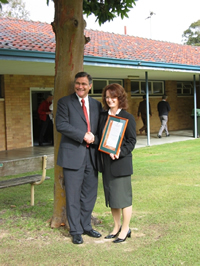 Curtin University Library. Geoff Gallop Collection. Records of Geoff Gallop. Geoff Gallop and Carolyn Lukas of Canning College, winner of the Premier's Teacher of the Year award, 2004. GG00020/40
Curtin University Library. Geoff Gallop Collection. Records of Geoff Gallop. Geoff Gallop and Carolyn Lukas of Canning College, winner of the Premier's Teacher of the Year award, 2004. GG00020/40
Viewed in retrospect there have been few politicians who worked harder throughout their career to balance the various levels of demands placed on members at all levels of the political and parliamentary process.


